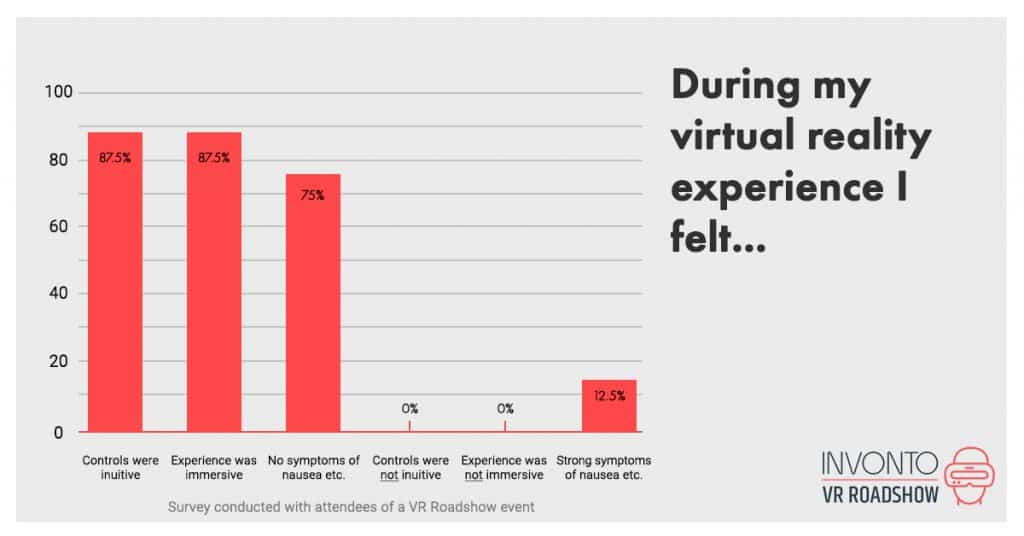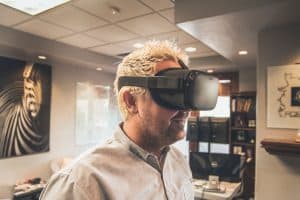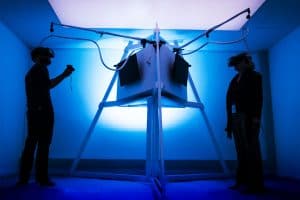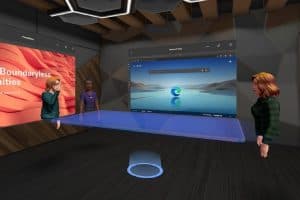Transform Business Collaboration Using Virtual Reality Technology
An Ambitious Future Beyond Gaming
Virtual reality has really carved out a space within the gaming industry in recent years. VR is ushering in a new generation of gaming that gives players immersive, first-person perspective experiences. The gaming industry has embraced virtual reality to bring entertaining experiences like SuperHot and Beat Saber to a market starved for something new. The global VR gaming market size is expected to be worth 22.9 billion by the end of 2020. Virtual reality trends show that this rapid growth isn’t stopping anytime soon. This is great news…for gamers. Certainly an emerging technology as revolutionary as virtual reality has even more to aspire to? We think so.
Crawl. Walk. Sprint.
You might have heard some claim that virtual reality technology will amount to nothing but a niche gaming experience, but this could not be further from the truth. In the last few years, developers like Oculus and HTC have worked to make virtual reality more accessible and more affordable. Just this year Oculus launched the Oculus Quest, a standalone wireless virtual reality headset. The Quest gives users the freedom to try desktop-quality experiences without a clunky setup. In early 2020, Oculus will ditch the controllers for hand-tracking, a more natural forms of interaction that is perfect for non-gamers. As virtual reality continues to mature, the slow crawl of progress will become a sprint. Virtual reality is relevant now more than ever before and people are taking notice.
Greater Business Adoption In The Next Three Years
While virtual reality gaming will continue to grow, this technology is finding new audiences in several key industries.A report by MarketWatch suggests the global virtual reality market will be worth $117 billion by 2022. The majority of this growth will be driven by business adoption. From healthcare to the construction industry, virtual reality will radically change the way we do things just like the iPhone did when it launched in 2007. Virtual reality solutions will solve the enterprise challenges of our immediate future to improve user engagement, retention, and performance.
Bringing Virtual Reality Innovation To New Jersey
We believe so strongly in the potential of VR for solving business use cases, we decided to do something about it. Invonto recently launched the VR Roadshow, a series of interactive events in New York and New Jersey designed to educate organizations on the benefits and practical applications of VR. Invonto has demonstrated the potential of virtual reality technology through hands-on edutainment and had an opportunity to learn what business leaders and local community members think about virtual reality. The program is the only one of its kind and marks an important step in our mission to help New York and New Jersey businesses through technology adoption. Check out our VR Roadshow video below.
What Does New York and New Jersey Think About Virtual Reality?
After a few successful VR Roadshow, we seek feedback from our attendees asking them about their views on virtual reality. Here are some of our findings.
What is your familiarity with with virtual reality prior to the VR Roadshow event?
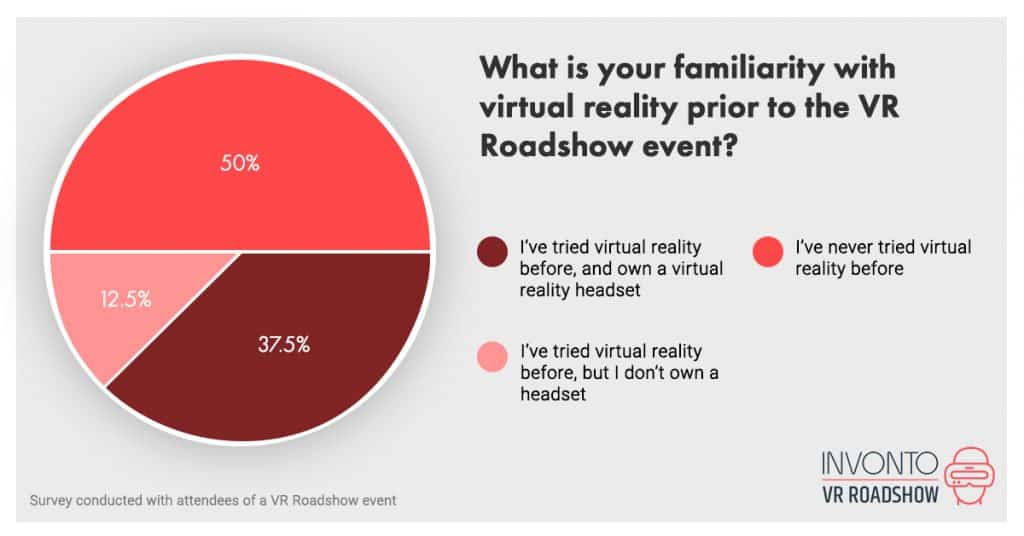
Throughout the events, we quickly learned that a large majority of users never tried virtual reality before the VR Roadshow. When asked why, many suggested that the current price for a virtual reality headset was limiting accessibility. While understandable, this hurdle is quickly fading away. Virtual reality headsets will only get less expensive and more powerful as we continue to innovate and demand grows higher. The Oculus Go now costs $199 and Oculus Quest with hand controller costs $399, far less expensive than the latest iPhone.
What do you think about the future of virtual reality and its potential?
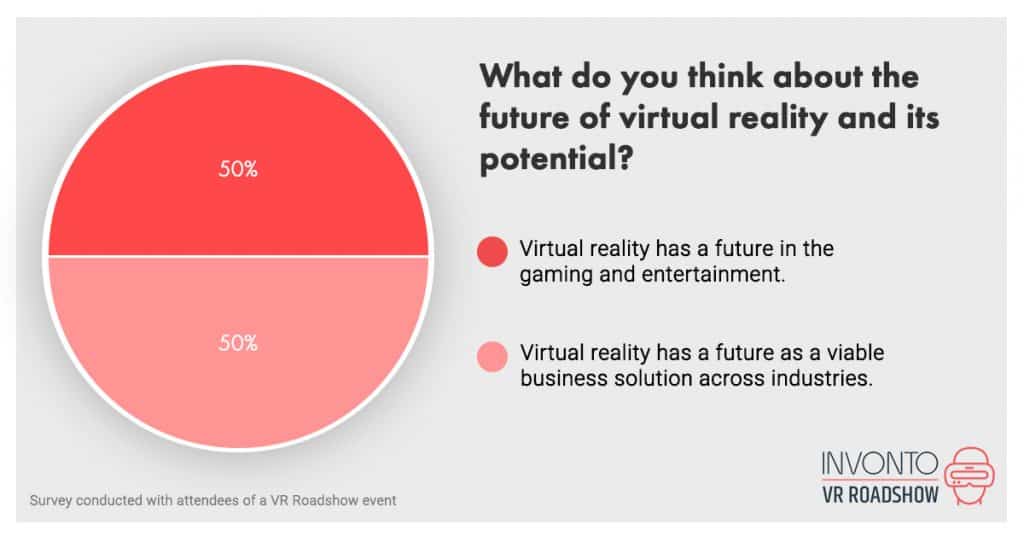
Another interesting statistic emerged during our survey. We learned that our users were split down the middle when asked about the future of virtual reality as a gaming platform or business solution. We naturally believed this would skew toward virtual reality as a gaming platform, but was pleasantly surprised that more users saw virtual reality as a viable business solution in the near future. Many cited that the VR Roadshow encouraged this thought process. Virtual reality certainly has potential in a wide variety of industries and this will only grow as more businesses build customer-centric experiences with VR.
Besides gaming, which other industries do you think can benefit from virtual reality technology?
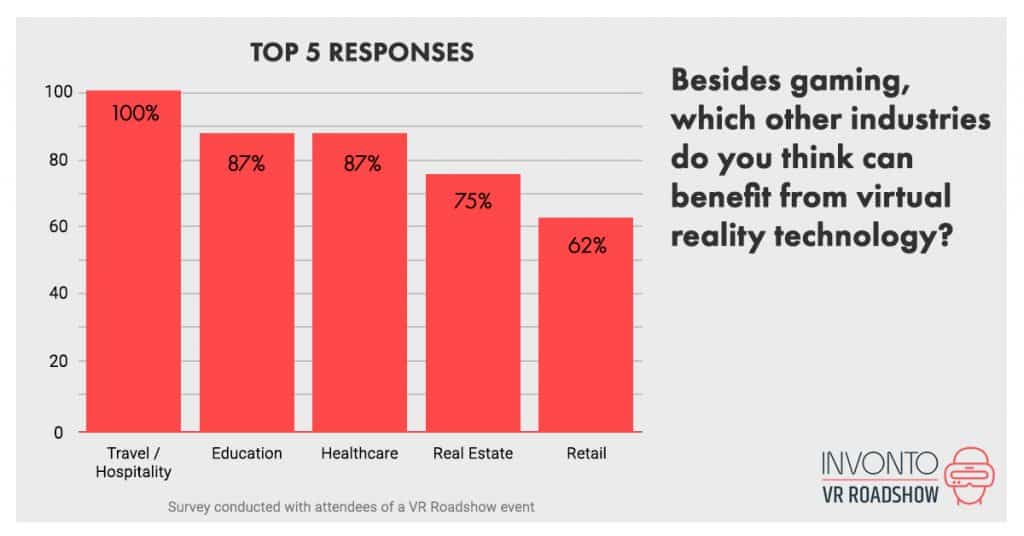
While we are well aware of how virtual reality can apply to several industries, we were curious what our attendees thought. Out of a list of eleven industries emerged five key industries: travel, education, healthcare, real estate, and retail. We are already seeing many virtual reality experiences materialize in these industries. In healthcare, virtual reality is already being used to better equip medical professionals to aid a patient in life-or-death scenarios. The Children’s Hospital of Los Angeles is experimenting with a virtual trauma center to train its doctors to assess and execute treatments for trauma patients quickly. These real-world simulations are a great way for medical professionals to adjust to high-stress situations and improve the chances of saving lives. This is something a mannequin, traditionally used in medical training, cannot replicate.
The ability for a user to become fully immersed in virtual reality is not an exaggeration. Even in less complex experiences, the user quickly adjusts to their environment. During our survey, we learned that our virtual reality experience was not only easy to use, but was extremely immersive. Very few users experienced any symptoms of nausea during their walkthrough.
How likely are you to recommend virtual reality to a colleague?
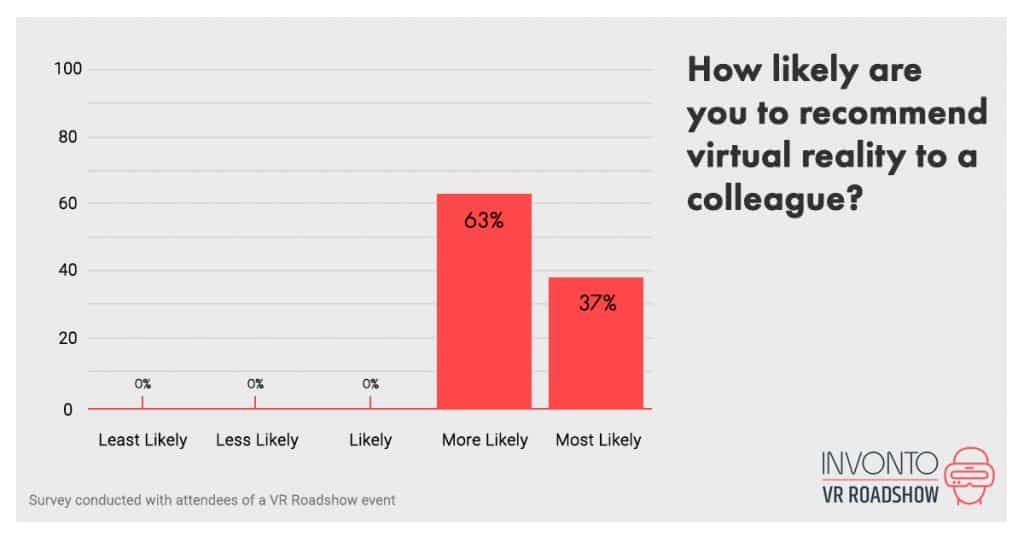
Overall, VR Roadshow attendees were comfortable recommending virtual reality to a colleague. This was a fascinating discovery, considering half of our attendees were using virtual reality for the first time. All of our attendees highly recommended our virtual reality experience.
Three Virtual Reality Trends To Prepare For In 2020
The insights we discovered during the VR Roadshow point to an even greater trend: virtual reality is becoming more mainstream. The data we gathered is echoed in nationwide studies that predict virtual reality with grow exponentially over the next five years. Here are some virtual reality trends to look out for in 2020.
Virtual Reality Will Continue To Expand Our Digital Horizons
Facebook is investing heavily in virtual reality technology through Oculus. With a variety of virtual reality headsets and an increasing library of quality entertainment, Mark Zuckerberg expects more non-gaming consumers to warm-up to owning their own headset.
At OC6, Zuckerberg made a number of exciting announcements including the introduction of hand-tracking, new social VR experiences with Facebook Horizon, and increased headset performance with the Oculus Link. All these Oculus updates aim to make virtual reality more social and improve engagement with non-gamers.
VR Finds a Permanent Place In Training and Education
Speaking of non-gamers, virtual reality tools are expected to see immense growth in the education space. In particular, schools will be making large investments in bringing lessons to life through the power of virtual reality. A recent survey conducted by Perkins Coie noted that 41% of respondents agreed that virtual reality would be most applicable within education.
By implementing virtual reality in the classroom, students will gain a greater understanding of spatial structures, language associations, and lesson content. A study by the University of Maryland discovered that virtual reality contributed to more motivated students and greater information retention.
The same is true in the corporate environment. Invonto recently built a virtual reality laboratory for Merck, one of the global leaders in pharmaceuticals. The applications allows Merck stakeholders to move through and interact with the laboratory before construction begins. The feedback gathered was instrumental in improving Merck’s lab construction process, avoiding costly errors, and reducing their investment.
Merck isn’t the only company investing in virtual reality. Several Fortune 500 companies like Boeing, UPS, and Walmart are implementing virtual reality in workforce education and training programs. UPS is using the HTC Vive to train drivers to be more observant on the road and improve driver safety. Since implementation, learning retention has climbed to 75%.
In our book, The Digital Transformation Cookbook, we discuss how Walmart is quickly building their VR program and distributing it to 4,600 stores nationwide. Thanks to Oculus’ portability, Walmart employee no longer need to meet at an educational facility. Instead, employees can engage in training scenarios to improve customer service and compliance from their store.
Consumers Will Demand VR Entertainment That Is Diverse and High Quality
Virtual reality will continue to saturate other forms of entertainment outside of gaming. Improvements to VR are making the technology far more accessible for consumer entertainment. Apps like MelodyVR are bringing your favorite live performances to your living room and giving you an opportunity to experience them without the outrageous ticket fee.
In the world of sports, virtual reality will transform the way players and consumers experience the game. NextVR gives consumers the best seat in the house to see events from FOX Sports, the WWE, and the NBA all on-demand. Some platforms even give you the ability to change perspective so you’ll always have the best view of the action.
In Hollywood, virtual reality is gaining traction within independent film festivals. Directors and producers are excited at the possibilities virtual reality brings to filmmaking. Since virtual reality is a new form of entertainment, it can introduce new filmmaking techniques and incorporate other senses like touch and smell. Increasing curiosity, enthusiasm, and investment will determine if 2020 will see VR films and series hit mainstream audiences.
As these technologies mature, consumers will come to expect virtual reality from their favorite entertainment platforms and services.
What Is Next?
The future of virtual reality is bright. During our first few events, we saw an increase in interest in virtual reality from our attendees. Many of them already understand that virtual reality technology has the potential to transcend niche gaming. In the coming years, we should see wider adoption from businesses as the hardware becomes more accessible to consumers. As we stride into 2020, Invonto will continue hosting VR Roadshow events for businesses and organizations. If you are interested in bringing the VR Roadshow to your business, you can reach out to us using the form here or the contact information below. Alternatively, if you are interested in our virtual reality development services, you can learn about what we offer on our service page.
Did we miss any virtual reality trends? Let us know!
